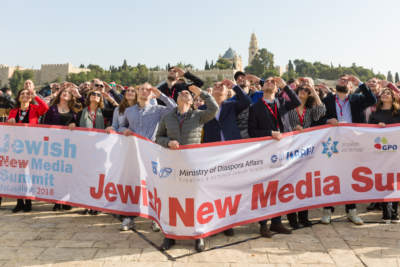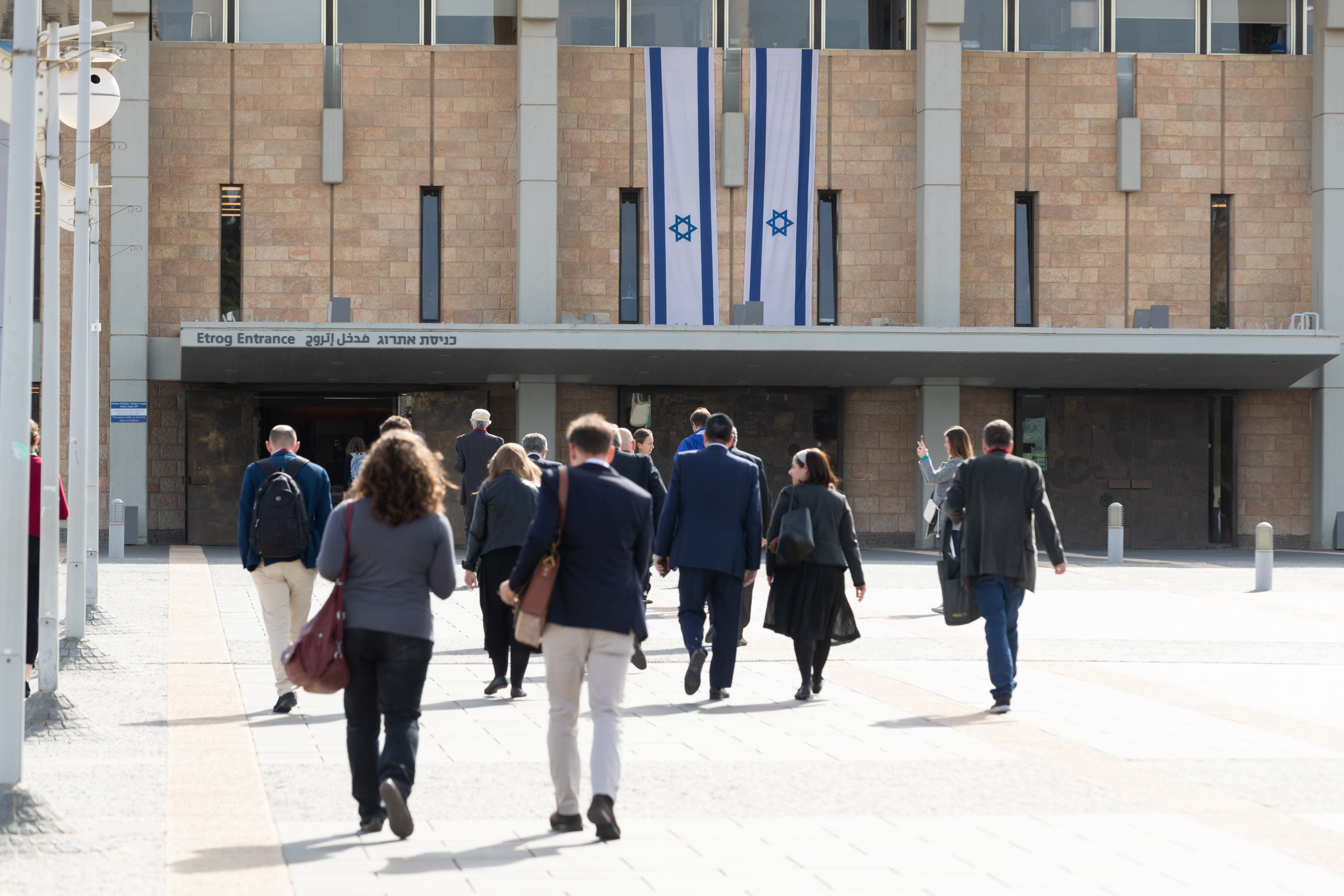Though 150 journalists and bloggers from 30 countries had gathered in Jerusalem for the Israeli Press Office-sponsored Jewish New Media Summit in late November, American Jewry was very nearly the only subject of conversation when discussing the strained relationship between Israel and the Jewish Diaspora.
Over the course of the three and a half day conference, Israeli officials displayed an array of different, and at times contradictory, views on Israeli-Jewish American ties as concerns about the Boycott, Divestment, and Sanctions (BDS) movement lurked in the background.
Michael Oren, former Israeli ambassador to the United States and now deputy minister in the prime minister’s office, embodied this complexity in a speech welcoming participants on the first night of the summit.
After stating that Trump’s administration is the friendliest that Israel has ever known, and reassuring the crowd that Netanyahu had the situation with Gaza under control after a near-war with Hamas in early November, Oren took a sharp turn into the need for Israel to recognize non-Orthodox streams of Judaism in the wake of the late-October shooting in Pittsburgh, in which a Conservative synagogue had been targeted by a white supremacist.

But more than just offering strong words about religious pluralism in Israel, Oren gave instructions to American Jews on how to achieve it by discussing the threat of financial boycotts against the Israeli government. Oren was not lacking for irony, as boycotts are a strategy also espoused by the BDS movement, a movement officially focused on ending the Israeli occupation of Palestinian territories, which Oren had called anti-Semitic earlier in his speech.
“American Jewish leaders will come [to Israel] and they’ll talk about pluralism, as they should. They may talk about the Kotel, they may talk about women’s rights, they may talk about freedom of expression, freedom of religion,” Oren said. “That’s definitely talking Jewish. I tell them to talk Israeli.
What’s speaking Israeli? Mentioning a statistic that comes out of the Ministry of Diaspora Affairs that states that 6.35 percent of our GDP is made up of donations and investments from Diaspora Jews, particularly from the American Jewish community. 6.35 percent of our GDP amounts to 60 billion shekels – which is our defense budget.
So you can say to Israelis: do you want to risk your defense budget by not recognizing the Reform and Conservative movements in the United States? There are now 36 Jewish members of Congress after the midterms. All of them are reform, every single one of them. The Americans give [Israel] nearly 4 billion in dollars in military aid per year. Do you want to jeopardize that?”
The rest of the Jewish New Media Summit did its best to avoid Oren’s level of confrontation with the Israel-Diaspora divide, preferring instead to focus on broader subjects, like anti-Semitism around the world. One panel, however, titled “What have you done for the Diaspora in the past year,” asked members of the Knesset, Israel’s parliament, to discuss their track record in advocating for Diaspora Jewry in the Israeli government.
The consensus: not much had been done. The three MKs that spoke (Elazar Stern from the government opposition; Rachel Azaria and Sharren Haskel from the government coalition) spent most of their time explaining to the audience how Israelis don’t understand world Jewry. Special focus was given to talking about young Diaspora Jews, and how the members of the Knesset perceive their connection to Israel.
“There’s a concern that young American Jews, and younger Jews in general, are not as strongly tied to Israel as the previous generation,” said Lahav Harkov, the Jerusalem Post journalist mediating the conversation. Turning to Kulanu MK Rachel Azaria, she asked, “What do you think Israel should be doing to reach out to young Jews around the world?”
“First of all, I want to say that the youngsters are always being looked down at by the older [generation]….So I’m not sure that’s true, but I do hear this growing concern,” Azaria responded.
“I think that if we bring them as partners on working on Israel’s democracy, that’s the future,” she said, adding to the crowd: “We’re struggling here. I don’t know if you guys see it, how much we are struggling and how complicated it is.”
Likud MK Sharren Haskel also brought up young Diaspora Jews, specifically on college campuses, when asked what concerns she tended to hear about when traveling to Jewish communities around the world.
“I see a lot of the students taking a few steps back [from Israel-Palestine college politics] and saying ‘look, we just want to be students,’” she said. “‘We don’t want to have any kind of Jewish Israeli political agenda. We just want to enjoy campus life as any other US or Canadian citizens.’ … So a lot of the times they sort of alienate themselves” from Jewish campus life as a result,” Haskel said.
But even as tensions between Israel and American Jewry were discussed – and the state of young Jews in the Diaspora lamented – notably absent from the media summit was any acknowledgement from Israeli officials that the closeness between Israeli prime minister Benjamin Netanyahu and U.S. president Donald Trump is part of the reason that many American Jews, and young American Jews in particular, feel alienated from Israel.
To the dismay of many American Jews, Trump’s administration has effectively endorsed the ongoing Israeli occupation of the West Bank by alleviating pressure on Netanyahu to withdraw, most publicly by announcing the move of the American embassy to Jerusalem last year. The embassy move had long been delayed by U.S. presidents in order to pressure Israel into peace negotiations with Palestinian leadership.
In a Q&A session on the last night of the summit, Israeli Ministry of Foreign Affairs spokesperson Emmanuel Nahshon seemed almost casual about addressing that concern, when asked how Israel’s diplomatic strategy to reengage American Jewry would change after Trump’s presidency.
“Look, our long-term diplomatic strategy has not changed for decades, and it’s very simple,” Nahshon said. “Israel enjoys bipartisan support and friendship in the United States. And this is exactly the way we want it to be. We cultivate good relations with the political parties, and with the whole spectrum of opinion in the United States.”
But “there is also a reverse side of the coin,” he added. “We see also how some Jewish communities, and especially some young Jews in the United States, take their distance from Israel for a variety of reasons. For us, it is a source of worry. We want to bring them as close as possible.”
Nahshon continued on a tightrope similar to the one that Michael Oren had walked, legitimizing Jewish criticism of Israel only up until BDS.
“The state of Israel belongs to all Jews around the world,” he said. “So if you don’t like some policy of the state of Israel, fair enough. You don’t like this or that policy, that’s quite alright. And not only is it your right to express your dislike, but in a way it is also your duty because you are a shareholder with this enterprise.”
“But,” Nahshon clarified, “there is a big difference between that and participating in activities which are clearly anti-Israel activities…even if you don’t agree with the policies of the Israeli government, there are other ways to express your disagreement.”
Afterwards, many of the journalists left the summit confused by what it was exactly that the Israeli government had tried to achieve. Was it to have Diaspora Jewish journalists in open conversation with Israeli officials? Or to simply continue pushing the Israeli narrative about Diaspora Jewry at close quarters?
It remains an open question.
Lev Gringauz is a 2017-2018 reporting fellow with New Voices.

